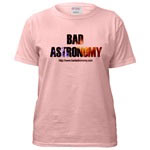
| Bad Astronomy |
|
|
|
BA Blog
|
|
Q & BA
|
|
Bulletin Board
|
| Media |
|
|
|
Bitesize Astronomy
|
|
Book Store
|
|
Bad Astro Store
|
|
Mad Science
|
|
Fun Stuff
|
| Site Info |
|
|
|
Links
|
| RELATED SITES |
| - Universe Today |
| - APOD |
| - The Nine Planets |
| - Mystery Investigators |
| - Slacker Astronomy |
| - Skepticality |
Buy My Stuff

Keep Bad Astronomy close to your heart, and help make me
filthy rich. Hey, it's either this or one of those really
irritating PayPal donation buttons here.
What is the cause of auroral sound that sometimes occurs with an aurora?
Date: Fri Jan 17 20:16:57 1997Posted by: Dane H. Strom
Grade level: 7-9
School/Organization: Brentwood College School
City: Mill Bay State/Province: B.C.
Country: Canada
Area of science: Physics
Message ID: 853553817.Ph
Message:
What is the cause of auroral sound the sometimes occurs with an aurora? This question is for a homework assignment...I hope you have the answer for it! Thanks a lot!
There are lots of stories of people saying they can hear the aurora borealis. It is not clear the sound is real, although it certainly could be.
First, what is an aurora? It is a ghostly glow seen mostly in the extreme northern or southern latitudes (near the North and South poles) that is caused by high-speed particles from the Sun slamming into the Earth's atmosphere. The Earth's magnetic field guides the particles to the north or south pole, where they hit air molecules. This ionizes (strips an electron off) the air. When the electron recombines with the air molecule, energy is released in the form of light.
So aurorae are an electrical/magnetic phenomenon. They occur very high in the atmosphere, at least 90 or so kilometers high. This high, the air is extremely thin and not capable of supporting sound. Yet people claim to hear a crackling sound, like static electricity. There are several possibilities: one is that the sound is simply not real, and people are mistaken. Another is that the sound is real, and is caused by something closer to the Earth that is being sparked by the aurora (maybe a local magnetic effect). No one knows for sure!
There are lots of great sites about aurorae on the Web. Here are a few:
|
|
MADSCI Q&A
Q&A 1996
Q&A 1997
Q&A 1998
Q&A 1999
Q&A 2000
| Subscribe to the Bad Astronomy Newsletter! |
| Talk about Bad Astronomy on the BA Bulletin Board! |